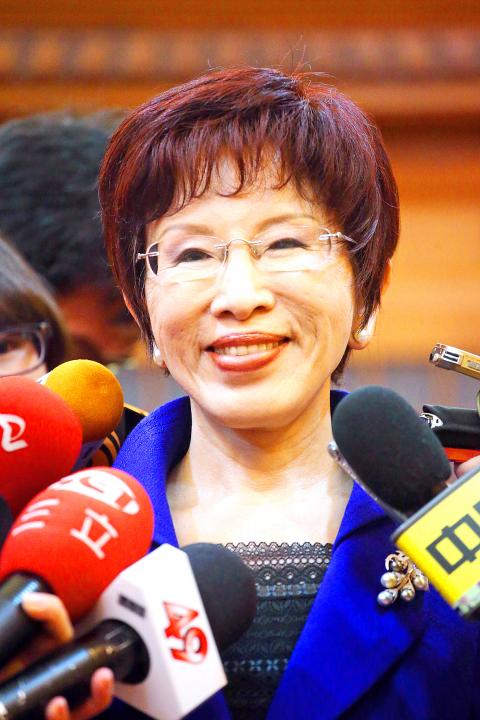Deputy Legislative Speaker Hung Hsiu-chu (洪秀柱) yesterday emerged as the only candidate qualified to run in the Chinese Nationalist Party’s (KMT) presidential primary after obtaining the necessary number of signatures from KMT members.
A screening committee announced that Hung had obtained 35,210 valid endorsements from registered members, surpassing the 15,000 threshold.
Former Department of Health minister Yaung Chih-liang (楊志良), the only other person to file registration papers, obtained only 5,234 valid signatures, failing to meet the requirement, the committee said.

Photo: CNA
Hung had submitted more than 60,000 signatures and Yaung more than 30,000, but many of them were disqualified for various reasons, the committee said.
According to the KMT’s primary regulations, Hung must next face a public opinion poll, and would be required to garner the support of at least 30 percent of respondents.
The KMT has yet to decide how to conduct the poll, but one of the likely options is to ask respondents to choose between Hung and Democratic Progressive Party Chairperson Tsai Ing-wen (蔡英文).
Should Hung fall short of the 30 percent threshold, the party might opt to draft another candidate to run.
While KMT Nomination and Review Committee convener Hau Lung-bin (郝龍斌) said the method and timing of the poll required further discussion, Hung urged the party to hurry, as the earlier the KMT knows in which direction it is heading, the more time it has to prepare its candidate.
Hung said that she believed she would ultimately be the party’s choice, adding that she would “take the responsibility, work hard and win [the election.]”
Meanwhile, Yaung announced that he was dropping his bid.
He said he wished Hung the best and hoped she exceeded the 30 percent threshold, adding that he would not consider running for a legislator or legislator-at-large post in the January elections.
In response to concern that the KMT would lack a strong vice presidential candidate, KMT Chairman Eric Chu (朱立倫) said that the party’s core interests were the same as Yaung’s — “distributive justice” — adding that the party’s nomination would adhere to its internal policies.
The only KMT members who appear to be somewhat competitive with Tsai in opinion polls — Chu and Legislative Speaker Wang Jin-pyng (王金平) — have said they would not enter the presidential race.
The KMT is the underdog heading into the January elections, hurt by its disastrous showing in the nine-in-one elections on Nov. 29 last year and the dismal approval ratings for President Ma Ying-jeou’s (馬英九) administration, which have dropped to about 20 percent.
Additional reporting by Lee Ya-wen and Chiu Yen-ling

SECURITY: As China is ‘reshaping’ Hong Kong’s population, Taiwan must raise the eligibility threshold for applications from Hong Kongers, Chiu Chui-cheng said When Hong Kong and Macau citizens apply for residency in Taiwan, it would be under a new category that includes a “national security observation period,” Mainland Affairs Council (MAC) Minister Chiu Chui-cheng (邱垂正) said yesterday. President William Lai (賴清德) on March 13 announced 17 strategies to counter China’s aggression toward Taiwan, including incorporating national security considerations into the review process for residency applications from Hong Kong and Macau citizens. The situation in Hong Kong is constantly changing, Chiu said to media yesterday on the sidelines of the Taipei Technology Run hosted by the Taipei Neihu Technology Park Development Association. With

CARROT AND STICK: While unrelenting in its military threats, China attracted nearly 40,000 Taiwanese to over 400 business events last year Nearly 40,000 Taiwanese last year joined industry events in China, such as conferences and trade fairs, supported by the Chinese government, a study showed yesterday, as Beijing ramps up a charm offensive toward Taipei alongside military pressure. China has long taken a carrot-and-stick approach to Taiwan, threatening it with the prospect of military action while reaching out to those it believes are amenable to Beijing’s point of view. Taiwanese security officials are wary of what they see as Beijing’s influence campaigns to sway public opinion after Taipei and Beijing gradually resumed travel links halted by the COVID-19 pandemic, but the scale of

A US Marine Corps regiment equipped with Naval Strike Missiles (NSM) is set to participate in the upcoming Balikatan 25 exercise in the Luzon Strait, marking the system’s first-ever deployment in the Philippines. US and Philippine officials have separately confirmed that the Navy Marine Expeditionary Ship Interdiction System (NMESIS) — the mobile launch platform for the Naval Strike Missile — would take part in the joint exercise. The missiles are being deployed to “a strategic first island chain chokepoint” in the waters between Taiwan proper and the Philippines, US-based Naval News reported. “The Luzon Strait and Bashi Channel represent a critical access

Pope Francis is be laid to rest on Saturday after lying in state for three days in St Peter’s Basilica, where the faithful are expected to flock to pay their respects to history’s first Latin American pontiff. The cardinals met yesterday in the Vatican’s synod hall to chart the next steps before a conclave begins to choose Francis’ successor, as condolences poured in from around the world. According to current norms, the conclave must begin between May 5 and 10. The cardinals set the funeral for Saturday at 10am in St Peter’s Square, to be celebrated by the dean of the College